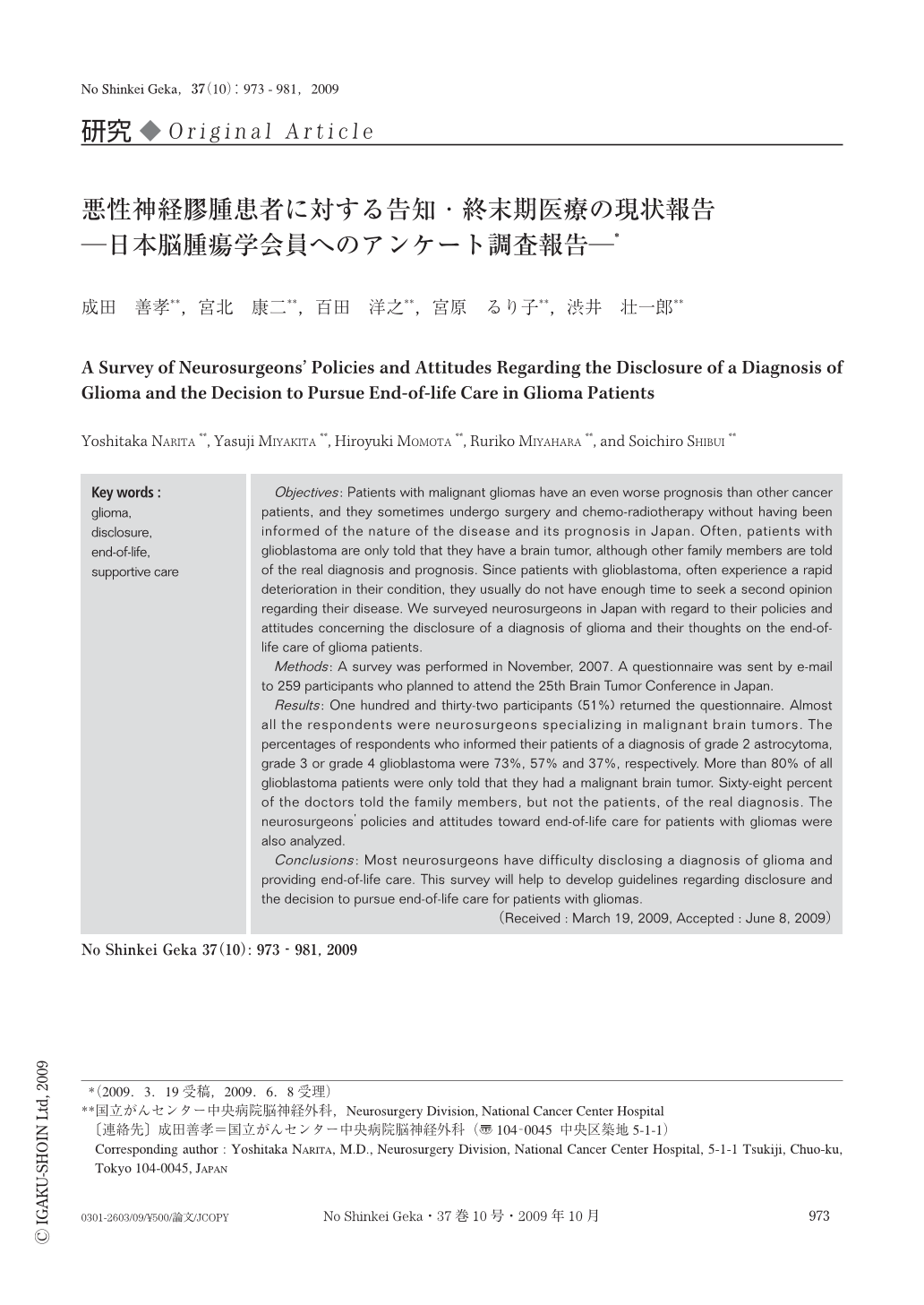Japanese
English
- 有料閲覧
- Abstract 文献概要
- 1ページ目 Look Inside
- 参考文献 Reference
Ⅰ.はじめに
悪性脳腫瘍は希少癌でありながら,病理診断が多岐にわたるため,患者・家族にとっては情報も少なく理解しにくい病態である.未だ予後不良な疾患である膠芽腫の患者では,病名や予後について詳細な説明を受けることがなく治療を受けていることも多い.特に失語や意識障害のある患者,神経症状の進行した患者が,病名や予後について十分に説明されることなく治療を受けていることもある.他臓器のがん患者は自分の病態や予後について十分な説明を受けて自ら治療法を選択していることが多いのに対し,悪性脳腫瘍では症状が急速に進行するために,患者がセカンドオピニオンなどを求める機会すら多くないのが現状である.本研究では悪性神経膠腫患者によりよい治療を行うために,「現在どのような告知が行われ,治療方針について説明されているのか」患者本人に対する告知の現状について調査した.
また,意識障害のある患者の終末期医療を積極的に受け入れてくれる緩和ケア病院はまだまだ少なく,現状の保険医療制度では悪性脳腫瘍患者の行き場がみつからないという問題も起きている.終末期を在宅ですごす患者も少しずつ増えてきているものの,40歳未満では介護保険を使えないなどの制約も多く,十分な終末期ケアが受けられないことも多い.今回,悪性脳腫瘍患者に対して化学療法などの積極的な治療をいつまで行うかといった問題など,終末期ケア(end-of-life care,ターミナルケア)・緩和ケアの現状についても調査を行い,悪性脳腫瘍患者の告知や終末期ケアに関する問題点について検討した.
Objectives: Patients with malignant gliomas have an even worse prognosis than other cancer patients, and they sometimes undergo surgery and chemo-radiotherapy without having been informed of the nature of the disease and its prognosis in Japan. Often, patients with glioblastoma are only told that they have a brain tumor, although other family members are told of the real diagnosis and prognosis. Since patients with glioblastoma, often experience a rapid deterioration in their condition, they usually do not have enough time to seek a second opinion regarding their disease. We surveyed neurosurgeons in Japan with regard to their policies and attitudes concerning the disclosure of a diagnosis of glioma and their thoughts on the end-of-life care of glioma patients.
Methods: A survey was performed in November, 2007. A questionnaire was sent by e-mail to 259 participants who planned to attend the 25th Brain Tumor Conference in Japan.
Results: One hundred and thirty-two participants (51%) returned the questionnaire. Almost all the respondents were neurosurgeons specializing in malignant brain tumors. The percentages of respondents who informed their patients of a diagnosis of grade 2 astrocytoma, grade 3 or grade 4 glioblastoma were 73%, 57% and 37%, respectively. More than 80% of all glioblastoma patients were only told that they had a malignant brain tumor. Sixty-eight percent of the doctors told the family members, but not the patients, of the real diagnosis. The neurosurgeons’policies and attitudes toward end-of-life care for patients with gliomas were also analyzed.
Conclusions: Most neurosurgeons have difficulty disclosing a diagnosis of glioma and providing end-of-life care. This survey will help to develop guidelines regarding disclosure and the decision to pursue end-of-life care for patients with gliomas.

Copyright © 2009, Igaku-Shoin Ltd. All rights reserved.


